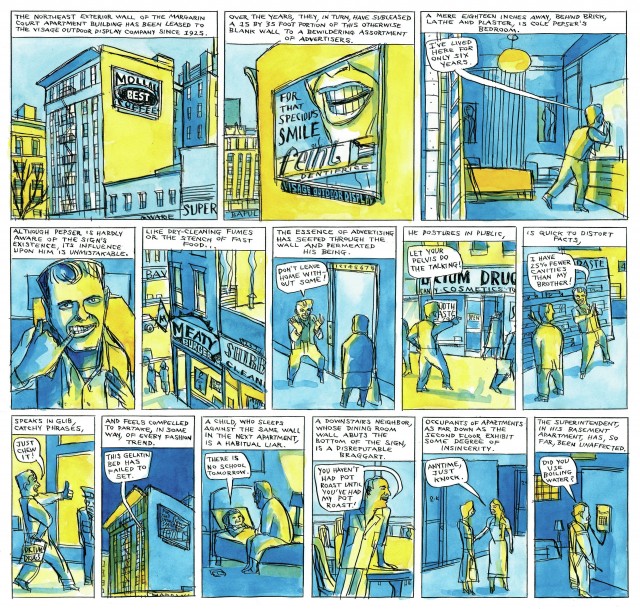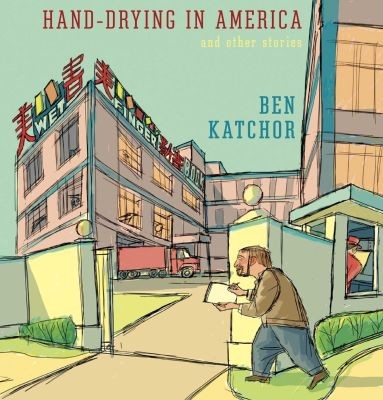
“Cole Pepser’s Bedroom” is one of many marvelous Ben Katchor strips that combine unique, old-fashioned characters and a changing consumer culture amid urban environments (© 2013 by Ben Katchor)
HAND-DRYING IN AMERICA AND OTHER STORIES (Pantheon, March 2013, $29.95)
Monday, April 1, NY Comics & Picture-story Symposium, Parsons the New School, 2 West 13th St., Bark Room, 7:00
Saturday, April 6, MoCCA Arts Festival, 69th Regiment Armory, 68 Lexington Ave. at 26th St. festival admission $12-$15
Monday, April 15, Greenlight Bookstore, 686 Fulton St., Brooklyn, free, 7:30
www.katchor.com
In a March 2011 twi-ny talk, we asked Brooklyn-born cartoonist Ben Katchor whether he was afraid the physical book might be disappearing from the American landscape, and he responded, “Physical books will be around for a long time — I see them used as window and door props, and as structures to support laptop computers.” At that time, Katchor was promoting his first book in more than ten years, the graphic novel The Cardboard Valise, which came with a handle so you could carry it like a piece of luggage. For his latest book, Hand-Drying in America and Other Stories, Katchor has created an even larger, heavier hardcover without the handle, making it almost impossible to carry around, but it is no mere doorstop. Hand-Drying is a marvelous collection of more than 150 strips Katchor has drawn for Metropolis magazine, inventive and funny cartoons filled with the trademark old-fashioned characters, absurdist situations, and unusual city environments that Katchor has been detailing for several decades in such previous books as Cheap Novelties: The Pleasures of Urban Decay, The Jew of New York, and Julius Knipl, Real Estate Photographer: The Beauty Supply District. In Hand-Drying, Katchor continues his exploration of disappearing elements of modern urban living, from architecture and design to advertising and consumer products — including books.
In the front endpaper, investigative reporter Josef Fuss researches the severe environmental costs involved in the publishing process: “Each book is a minor ecological disaster,” he says to himself. In “The Tragic History of the Oversized Magazine,” Katchor is referencing Hand-Drying itself, tracing the development of large-scale magazines, explaining, “Their destiny is linked to the Cadillac Fleetwood Brougham, the porterhouse steak, the zoot suit and other material excesses of history.” In the last word bubble, a man holds a magazine that nearly matches his own size, proclaiming, “Wow, look at this spread!” Readers will be repeating those words over and over as they turn the pages of Hand-Drying, which features such other knockout tales as “Open House Season,” which follows people who are obsessed with visiting open houses even though they are not looking for a new apartment; “The Committee for Architectural Neglect,” in which a group of officials “see no reason for a building to relive its glorious past”; “2nd Thought Mail,” in which a company sets up a ten-day waiting period in case letter writers don’t want to send that missive after all (a fabulous take on that feeling one gets when instantly regretting sending an e-mail that can’t be recalled); and “Contiguous Control,” in which a man ends up in the hospital after refusing to use the remote control. “Who turns the pages of your books?” he asks his son.
But Katchor is no mere crank complaining of the failings of our modern, techno-driven, instant-gratification society, lamenting the passing of the days of getting up and walking to the television set to change the channel, friendly gas-station attendants who would engage customers in small talk while working the pump, and drying one’s hands with paper towels in rest rooms instead of having to use loud, abrasive hand-drying machines. Instead, he celebrates the unique and unusual in the past, present, and future, visualizing a fascinating societal underground that still exists in the nooks and crannies of our daily existence. In the back endpapers, freelance Chinese journalist Fallo Yank disputes Fuss’s findings, determining that “literary and coffee-table books account for an insignificant portion of the world’s print pollution,” that the real problem is the content of the books, including “a deluxe full-color edition of an esoteric literary comic strip.” Hand-Drying in America is no mere window or door prop but rather an endlessly entertaining and extremely funny and insightful look at human nature and our changing world as only Katchor can depict it. The self-deprecating cartoonist will be participating in a conversation with Gil Roth, host of “The Virtual Memories Show,” at the thirty-eighth meeting of the NY Comics & Picture-story Symposium on April 1 at 7:30 at Parsons the New School, will be signing copies of his books at the Pantheon booth at the MoCCA Arts Festival on April 6 at the 69th Regiment Armory, and will take part in an illustrated discussion with writer Nicholas Dawidoff at the Greenlight Bookstore in Brooklyn on April 15 at 7:30.
